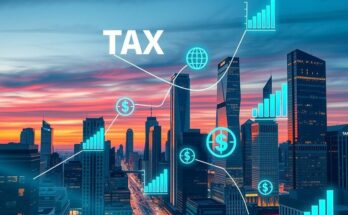Argentina’s economic recovery under President Javier Milei is stagnating due to fragile achievements and investor caution. Key initiatives include a marked reduction in inflation and an anticipated $12 billion IMF program. However, challenges such as an overvalued peso and political opposition threaten sustained progress. With mid-term elections looming, the prospect of fundamental reforms remains uncertain, as the country grapples with ongoing economic instability.
The Wall Street Journal reports that Argentina’s economic recovery under President Javier Milei is currently on hold. Investors are adopting a cautious stance due to the fragility of the government’s achievements and are awaiting clearer long-term strategies. Notably, Milei has successfully reduced monthly inflation from 20% to 2% and achieved a fiscal adjustment without significant protests, a situation that may soon change given recent developments.
The article further highlights an anticipated new IMF program, which aims to provide USD 12 billion to refinance part of Argentina’s USD 40 billion debt left by former President Mauricio Macri’s administration. However, this funding may fall short of addressing critical challenges, such as lifting exchange controls. Additionally, despite President Milei’s emergency decree enabling further borrowing from the IMF, market reactions have remained subdued, as this agreement was largely anticipated.
Analyst Mauro Roca emphasizes that the Argentine peso is overvalued against the US dollar, leading to inflated local prices in comparison to international standards. An ill-timed easing of capital controls or updates to the exchange rate could potentially jeopardize the recent gains made in controlling inflation. The Wall Street Journal cautions that breaking the cycle of economic crises in Argentina will require years of effort, and structural reforms are essential for achieving sustainable growth and fiscal stability.
In the present political landscape, President Milei enjoys a popularity rating exceeding 50%, despite facing controversies, including the $LIBRA token scandal. The forthcoming mid-term elections are poised to be critical for the government’s ability to continue its reform agenda. Although Milei has made significant strides in inflation control, the prospects for an economic “miracle” in Argentina remain uncertain, dependent on deeper reforms and careful policy implementation in the months ahead.
Recent developments, including mass protests and a nationwide strike called by major labor organizations, as well as the return of former Economy Minister Sergio Massa urging unity among Peronists against Milei’s policies, underscore the challenges ahead. According to The Wall Street Journal, “Argentina’s economic future will depend not only on the new agreement with the IMF but also on the government’s ability to implement structural reforms that consolidate fiscal stability and sustainable growth.” Progress may be paused until after the mid-term elections in October, highlighting the precarious nature of the current situation.
In summary, while President Javier Milei has made notable progress in combatting inflation and adjusting fiscal policies, Argentina’s economic recovery remains precarious and reliant on forthcoming structural reforms. Investor apprehension, the anticipated IMF agreement, and political challenges, including looming mid-term elections, complicate the scenario. The country must navigate these hurdles to establish a sustainable economic future; thus, optimism remains restrained amid a backdrop of uncertainty.
Original Source: en.mercopress.com




